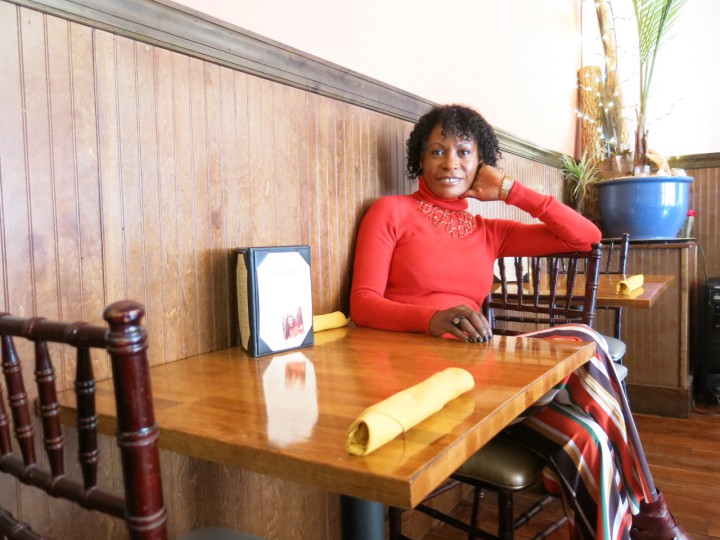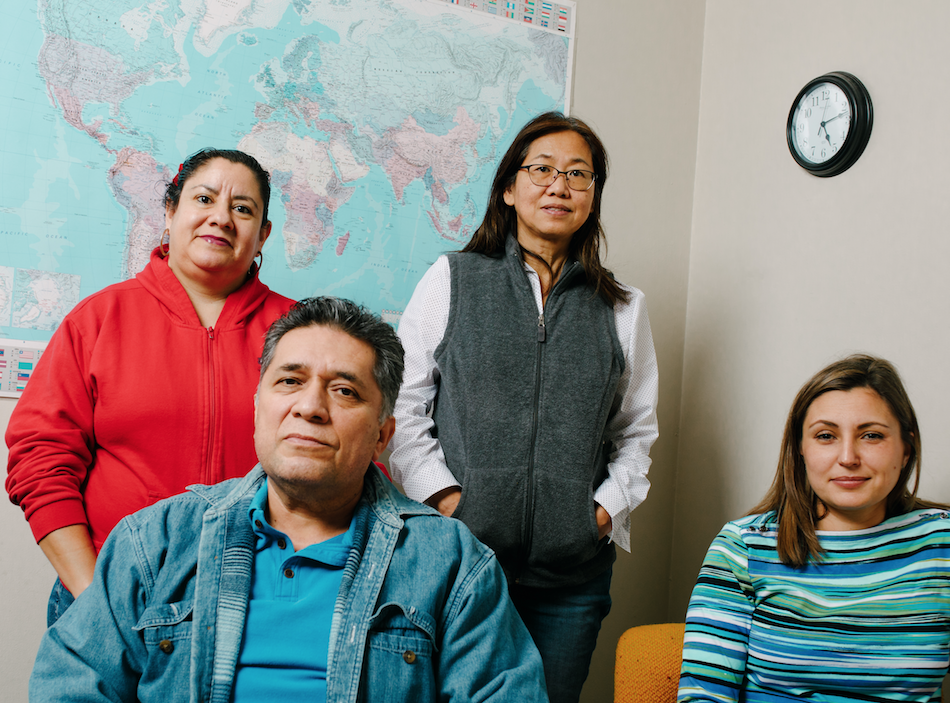Thanksgiving is about a lot of things besides gratitude: family, friends, colossal amounts of carb-loaded comfort food — and for some, football and a turkey coma.
But at its heart, Thanksgiving is really an immigrant story: the tale of some English folks who brought their families to an unfamiliar land in search of a better life. Nearly 400 years later, immigration is a hot-button issue, yet as of 2015, the foreign-born population in the U.S. topped 43 million. And bringing it closer to home, 2016 numbers show immigrants accounting for well over 7 percent of Asheville’s residents.
So how do today’s immigrants feel about this uniquely American holiday?
Time to be kind
“One of the first things I noticed about Thanksgiving is that people act more kind, they think about others more. I like that,” says Victor Garcia, who came to the U.S. from Mexico 17 years ago.
His wife, Ina Sanzana, agrees. “It kind of changes the attitude, and that’s good,” she says. “People stop and say, ‘Hi, how are you doing? How’s your health?’ Because sometimes in America, people are so busy they don’t want to take time to spend with others.”
Sanzana, who is originally from Chile, met her husband when they were both new arrivals to the U.S. taking English language classes at Asheville-Buncombe Technical Community College. They later continued studying English at the Literacy Council of Buncombe County and today work together for the same cleaning service in Asheville.
The couple embrace Thanksgiving in a familiar way — with lots of food. They sometimes gather at a friend’s home in Black Mountain for a potluck mish-mash of American and Latino dishes. Sanzana likes to make Chilean recipes such as empanadas and pastel de choclo (spiced beef casserole with cornbread crust). Garcia likes to cook as well, and for last year’s celebration he made the turkey.
They also have adopted the tradition of asking each guest to name a thing they are thankful for. “I like that part, because it’s kind of the purpose,” says Sanzana. “We have many blessings. The least we can do is think of one and say it.” One thing she and Garcia are thankful for, she adds, is being in America.
Talking turkey
Katie Forester, who moved to the U.S. from Thailand 18 years ago, can’t usually celebrate Thanksgiving at home because one of her two jobs requires her to work on the holiday. But her employer, an Asheville retirement community, does host a party that day with plenty of food, and she says she likes the cranberries.
But the turkey? Not so much. “It’s too dry,” she says.
Flor Flores agrees. “The turkey is so dry, and it takes so many hours to cook,” she says. “For me, I like the sweet potatoes, green beans — but the turkey and the stuffing? No.”
Unlike Forester, Flores, who immigrated to the U.S. from Mexico 21 years ago, is able to take time off from her house-cleaning job for Thanksgiving — an opportunity she gladly accepts. She spends the day with her husband, children and extended family, cooking, playing soccer at the park, eating and going to church.
They also drink ponche. This warm Mexican drink, made with fresh fruit, sugar and cinnamon, is a highlight for Flores. “Sometimes people put in alcohol, tequila, but not me,” she says. “And oh, it’s so good! I can drink five cups of it and not eat, just drink ponche.”
Last year was the first Thanksgiving in the U.S. for French chef Eva Andres-Hsu — she’s only lived here with her American wife for about a year and a half. And from a food standpoint, that gathering with friends in Atlanta was memorable.
“I thought this [turkey] would be the driest thing ever — it was huge!” recalls Andres-Hsu, an Asheville personal chef and private culinary instructor. “I thought that [my host] would put it in the oven, but when he opened the deep-fryer, I thought he was messing with me. I was like, ‘Come on, don’t be stupid!’”
But the turkey surprised her. “We brined it, and it was delicious,” she says. “We don’t really deep-fry things in France. It was a whole new world for me.”

This year, Andres-Hsu plans to make a French beef stew from her grandmother’s recipe and a dessert made with puff pastry and almond ganache. She says she likes that America has a holiday specifically focused on taking time to cook and sharing food with loved ones. “That is very much like my culture, so it’s heartwarming for me to have this time,” she says.
Five years after immigrating to the U.S. from Ukraine, Natasha Berehova, a stay-at-home mom, enjoys celebrating Thanksgiving every year with her young daughter and other family members. She makes some Ukrainian foods, including breads and sauces, but she also prepares typical American fare such as mashed potatoes, turkey and salad.
But how did she learn how to make traditional Thanksgiving dishes? “The internet, of course,” she says. “YouTube helped me.”
Marlene Levy was working at a hotel in her home country of Guatemala when she was swept off her feet by an American tourist. Now, having married her suitor and moved to Hendersonville with him four years ago, her eyes dance with excitement when she talks about the upcoming holiday.
“I love Thanksgiving — my mother-in-law is a good cook,” she says with a little translation help from her Literacy Council tutor, Dolph Hoehling. Levy’s husband’s family hosts a huge feast each year, a party she very much looks forward to. Although she loves the American food, she always contributes a big pan of chicken or pork tamales and a traditional Guatemalan turkey soup. The tamales go over particularly well. “They will eat two or three plates each until it’s all gone,” she says.
Levy left her own family behind in Guatemala, so she expresses deep gratitude for her husband and the close relationship she has with her in-laws. “Thanksgiving traditions here are very important to me; spending Thanksgiving at my mother-in-law’s is very important to me,” she says.
Irina Khasanova, office manager and English for Speakers of Other Languages specialist at the Literary Council, thinks family is key. After moving to the U.S. from Russia 22 years ago with her husband and two young sons, they celebrated Thanksgiving because the children learned about it in school. Now that her sons are grown, it’s not a priority.
“When it’s just the two of us for Thanksgiving, we do not prepare a big meal,” she says. Instead, they cook some foods they enjoy, go hiking and maybe watch a movie. “So we see it as a small vacation.”
Going deeper
Calypso restaurant owner Esther Joseph is a native of the Caribbean island of St. Lucia. Thanksgiving is not a part of the culture she grew up with, so she doesn’t make a point to celebrate it. But in the years she lived in New York City before she moved to Asheville six years ago, she observed during holidays with friends that Thanksgiving can cause a great deal of stress.
“It seems like something that most people do because it’s an expectation,” she says. “I see a lot of people running around like chickens because it’s Thanksgiving. And that takes away from the feeling that it’s supposed to be a holiday of good times, of being with family and friends.”
She also thinks that in addition to being grateful, there’s something else worth considering as we dig into our Thanksgiving feast. “I’ve always thought about how the reasons we do these things are being forgotten,” she says. “Maybe if we took the time to think about where it all began and where we are today as a nation, how attitudes toward immigration have changed. … For me, that would be great — to go deeper, to try to see what’s going on.”




Before you comment
The comments section is here to provide a platform for civil dialogue on the issues we face together as a local community. Xpress is committed to offering this platform for all voices, but when the tone of the discussion gets nasty or strays off topic, we believe many people choose not to participate. Xpress editors are determined to moderate comments to ensure a constructive interchange is maintained. All comments judged not to be in keeping with the spirit of civil discourse will be removed and repeat violators will be banned. See here for our terms of service. Thank you for being part of this effort to promote respectful discussion.